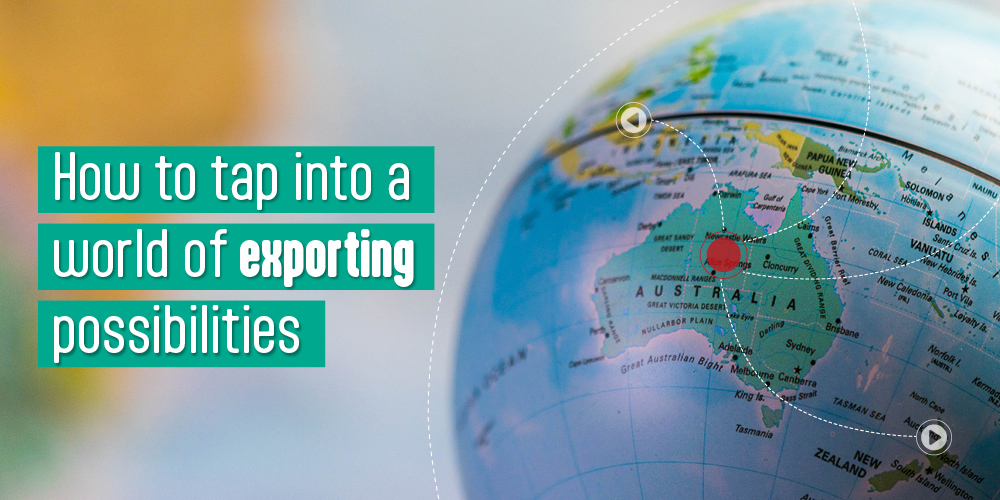Selling your goods or services overseas can seem like a big leap – and there are certainly some hurdles – but it could be good for business.
Exporting can provide your business with benefits such as increased productivity, increases in sales and profits, new customers, and clients and potentially better growth opportunities.
In fact, exporting is associated with a higher likelihood of a business surviving. A study has found that exporters are larger, more productive, more skill- and capital-intensive and more innovative. The study also found that exporters tend to be robust during an economic shock. For example, Australian exporters were more resilient to the shocks of the pandemic than non-exporters.i
That is because exporters were able to spread their business across different markets, taking advantage of markets that were growing while others were floundering.
With some research and planning, many businesses – big and small – can consider expanding their markets overseas. We often think of exporters as massive mining companies or manufacturers. But small businesses make up 62 per cent of the more than 56,000 Australian businesses that sell to international markets.ii
Online selling provides a platform
The growth in online sales is helping many small businesses to become exporters. It can be a great way of getting a start in selling overseas and to help test products in new markets.
Online sales growth slowed a little in 2022 but even so, there has been an eyewatering expansion in online sales. In 2016, global online sales were worth US$1.9 trillion or 8.7 per cent of retail sales.iii By the end of 2023, online sales are expected to reach US$6.51 trillion or 22.3 per cent of total retail sales.iv
Selling online can give you the chance to experiment with different business models and export methods. While traditional exporting usually means selling to another business overseas such as a distributor, wholesaler or a retail store, online exporting provides more options including selling directly to consumers. In this case, you might need to engage some extra help in logistics, social media, foreign language customer service and e-commerce website design.
You could also choose to join one of the major platforms such as Amazon, Etsy or eBay. For a fee, these types of platforms can give you a ready marketplace and may suit smaller businesses that are inexperienced in online selling.
What are the risks?
It pays to keep your eyes wide open when it comes to exporting. Success rests on being prepared and knowing the risks.
You will need to understand your potential customers by researching your target markets and looking into local regulations and cultural differences.
In some cases, it may also be necessary to find overseas partners and suppliers.
Managing the risks involved in exporting can make or break the success of your venture.
One of the biggest risks is movements in the Australian dollar. When our dollar is low against the currencies in your online markets, it is good news for you and your customers. You will still earn the same profit, but your product or service will be relatively cheaper for your customers. That might lead to an increase in demand and help you to win a bigger market share from competitors in other countries.
On the other hand, when the Australian dollar is strong and performing well against other currencies, goods and services are relatively more expensive for those in other countries.
Another major risk is not knowing the rules and regulations of the countries you are exporting to. For example, you will need to know what documentation is needed for your goods to clear customs, as this will vary between countries and also understand any import regulations that might affect you.
A third serious risk – a big spike in demand - might appear to be in the ‘good problem to have’ category but can actually cause business failure. You will need to consider how your business could handle a large increase in overseas orders while still meeting demand for your Australian market.
Meeting the costs
You will also need to make sure you have enough working capital to fund a push into export markets. The costs involved can include hiring consultants to provide advice on aspects of e-commerce, website building, customs and export rules and specific markets, and you may need extra capital to increase production.
Export Finance Australia (EFA) provides small to medium businesses with loans to help with the finance needed to secure export contracts or purchase orders. EFA also provides approved export businesses a guarantee to help access finance from their bank.
All state and territory governments also offer support for exporters based in their jurisdictions.
If you would like to discuss how to prepare your business for exporting, give us a call.
Am I ready to export?
You can work out if your business is set to go for exporting by checking out Austrade’s International Readiness Indicator. It is an online tool for new exporters that asks a series of questions and gives more information about the areas you may not have already thought about.
If you are not quite there yet, have a look at Austrade’s Go Global Toolkit, which provides information about the basics of exporting, advice about how to prepare for global growth and a list of resources.
i https://www.austrade.gov.au/news/publications/australian-state-of-exporters-report-2022
ii https://www.exportfinance.gov.au/resources/article/taking-on-export-opportunities-five-top-tips-for-australian-smes/
iii https://www.austrade.gov.au/ecommerce-guide/guide/introduction-to-online-exporting
iv https://www.shopify.com/au/enterprise/global-ecommerce-statistics.
